Updated: Habib Ali AlFardan was a 30-year-old Bahraini shop owner from Sar, who had undergone brain tumor removal less than four months before his arrest in 2015 after his house was raided at dawn. After being forcibly disappeared and tortured, Habib was convicted in an unfair trials. He is currently serving his sentence in Jau Prison.
On 12 May 2015, Habib’s house in Sar village was raided at 4 a.m. by over a dozen officers in civilian clothing and only two police officers. They started searching the place, confiscating personal items and money. Habib was interrogated alone in the bedroom, while his wife and daughter were interrogated in the lounge. The search lasted two hours, and his car was also confiscated. The apartment was raided again in the afternoon on the same day; the search lasted a long time, and many of Habib and his family members’ personal belongings were confiscated. The searches and arrest took place without any warrant being presented.
Habib was subjected to enforced disappearance for 12 days, during which time his family was looking for him, while both the Criminal Investigations Directorate (CID) and the Dry Dock Detention Center were providing them with false information, until Habib contacted them and stated that he was at the CID. The family submitted a request to the Public Prosecution in order to visit Habib at the CID, but they were able to visit him two days later at the Dry Dock Detention Center.
Habib was interrogated at the CID following his arrest for a period of almost one month. He was threatened with the spot on his head that was operated on and was subjected to numerous acts of psychological and physical harassment and torture. He was handcuffed throughout the interrogation period until night. He was presented to the prosecution after more than two weeks, but at the Public Prosecution Office, Habib could not speak with the prosecutor nor with his lawyer and could only sign the written confessions, fearing that he would be returned to the investigation building to be tortured again. After signing the confessions, Habib was transferred to Dry Dock Detention Center. Habib was eventually sentenced to 75 years in prison on charges of possession and manufacture of explosive substances and attempted murder. He was transferred to Jau Prison to serve his sentence.
The health condition of Habib continues to deteriorate, while the prison administration continues to deprive him of receiving proper medical treatment. His family confirmed that the size of the tumor in his brain has doubled again, necessitating urgent medical follow-up and possibly requiring another surgical operation, in addition to the one he underwent four months before his arrest.
As a result of the medical neglect policy he has been subjected to throughout his detention years, and the repeated deprivation of medical visits, Habib is suffering from memory weakness, difficulty in concentrating, unconsciousness seizures, frequent headaches, and pain in the head and eyes, which have left him bedridden.
Habib’s family complains about being deprived of knowing the true state of his health, as there are no reports explaining his medical condition. The prison administration has refused to respond to their request for his release to receive treatment and has cut off communication about him. The family has sent several letters and complaints to various relevant institutions, including the Ombudsman, which responded by stating that his condition is stable and does not require any operation. Habib’s family also tried to reach out to the National Institution for Human Rights without any response.
The deteriorating medical condition of Habib, coupled with the concerns raised by his family and ADHRB about his life due to the negligence of the relevant authorities in providing him with proper treatment, forces us to raise the alarm about potential negative future consequences and compels us to warn of the danger that threatens his life and could make him susceptible to a slow death.
The Bahraini authorities’ actions against Habib, from his arrest without a warrant to his coerced confession, violate international law, including the Convention Against Torture and the International Covenant on Civil and Political Rights, both of which Bahrain is a party to. Furthermore, the medical negligence he is facing while concerns regarding his brain tumor returning rise, constitutes a violation of the Nelson Mandela Rules. As such, ADHRB calls upon Bahrain to uphold its human rights obligations by taking his health conditions into consideration and by annulling Habib’s conviction while ensuring that any subsequent retrial is consistent with due process and fair trial rights. ADHRB additionally urges authorities to investigate claims of torture and ill treatment by prison officials and to hold those officials accountable, as well as to provide adequate and timely medical treatment to Habib and all prisoners.





